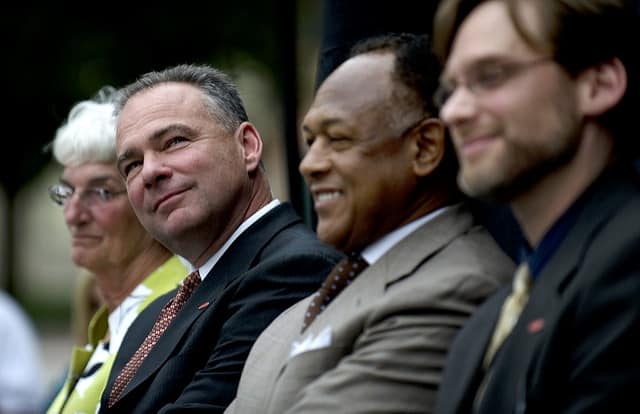Hillary Clinton announced her running mate this week. The buzz-machine responded, as per usual, and made sure we all know that (1) he is Catholic (hmm?), (2) was educated by Jesuits (gasp!) and (3) speaks Spanish fluently (oh my!). All true, yes. But true enough? I wonder.
Senator Tim Kaine went to the Jesuit high school in Kansas City and later delayed his studies at Harvard to spend a year volunteering in a Jesuit mission in Honduras. Media communication being what it is, these biographical data-points get reduced to a mere “…and that’s how he became fluent in Spanish.” As a Jesuit and a former international volunteer I have to say that this reduction seems a sad insult to the experience of international volunteers and the people they work with every day.
What does it mean that a candidate for the Vice Presidency of the United States took a year away from Harvard Law to teach welding and carpentry in a Jesuit mission in Honduras? I think it means a lot more than, “he speaks Spanish.”
Senator Kaine can (and will) answer for himself — but here are a few of my own thoughts based on how my two years as a Jesuit Volunteer in Belize affected me, and might impact someone in Kaine’s position.
- You get used to being surprised. During my time in Belize I found myself regularly surprised by a different way of seeing things, by a different set of cultural priorities. Ketchup on rice and beans? Surprisingly delicious. Trust me. At the end of two years I continued to discover new things, but I was no longer surprised at my being surprised. In a diverse political landscape, this openness to newness and difference — this ability to thrive in surprising circumstances — could be a real asset.
- You realize that people very different from you can teach you a lot about yourself. Volunteers realize that their way of seeing and experiencing the world is not the only way and, at times, may not be the best way. In our current political climate, any hint of disagreement blinds us to even recognize an opponent as a human worthy of respectful dialogue and personal compromise. In this climate, it would be hard to underestimate how important humility can be.
- You learn how to take the view from below. The people who live ‘below us’ economically, socially, and geographically see the world very differently from us. Their vision is authentic and authoritative if we are to fully understand the problems we face. To study at Harvard Law (one of the most privileged places in the world) and to defer your studies in order to teach welding in a vocational school in Honduras (one of the poorest and most violent countries in the world) clearly demonstrates a preferential option for the poor. Understanding this might help us to think and speak more meaningfully about the influence of Sen. Kaine’s Catholic faith on his political decisions.
- You redefine needs and wants. Volunteers have to live within new limits and begin to make choices about what is most important in a place where they can’t have everything they want – e.g. “I want peanut butter. But the stuff I brought is gone. But I still need protein! [sigh] Okay, rice and beans it is, again.” Long-term volunteers face all kinds of challenges to their preferences, but they generally rejoice in discovering creative alternatives to things they previously thought were non-negotiable. In a political climate often frozen by division, this creativity and flexibility could be a great gift.
- You see yourself more clearly. One of the great surprises of my time in Central America was how it helped me to see my own culture and country more clearly. Trying to explain Janet Jackson’s famous Super Bowl wardrobe malfunction in a country where women regularly breastfeed quite naturally and openly in public…well, I’ll just say it revealed some American nuttiness around sexuality and nudity. In this and other similar moments I began to examine and understand more profoundly how my North American background had formed me as a person. The experience left me with a greater appreciation of our strengths and greater honesty about our weaknesses. Both perspectives are essential in effective politics.
- Your ideology gives way to practical reality. Volunteers quickly learn that all the bumper-sticker cliches that got them to where they are don’t put food on the table and gas in the tank. Being the change you want to see in the world (thanks Gandhi) doesn’t get you out of dish duty. Volunteers learn to recognize how the truth of big ideas like faith and justice, community and simplicity, are lived and experienced in the daily reality of cooking and cleaning, working and worshiping. The reality of our experiences proves to be more enlightening than the big ideas we have about it. This practical realism makes for good governing.
- You understand the real power of faith. I received the sacrament of confirmation in Belize. Not because the Catholic Church in Belize was particularly inspiring or necessarily ‘a good fit’ for me, but rather because I saw the beauty of a faith community living together in diversity. I saw the universality from where the Catholic Church gets its name (katholikos = “universal” in Greek). I also saw how the simple faith of the poor is not a naive trust inspired by a state of desperation, but rather a life-commitment based on a clear vision of what it means to be truly human, what it means to live in love and community, what it means to say that God’s kingdom is the one we long for — especially when our earthly kingdoms continue to fail us.
* * *
I’m not sure what Senator Kaine would add to or remove from this list. But that a politician might be inspired by the simple faith and strength of marginalized communities who work hard every day to build up and reform not only their own town and country but to build the kingdom of God – well, I think that says a lot more than giving speeches in Spanish.
–//–
The cover photo, from Flickr user Richmond CenterStage, can be found here.


